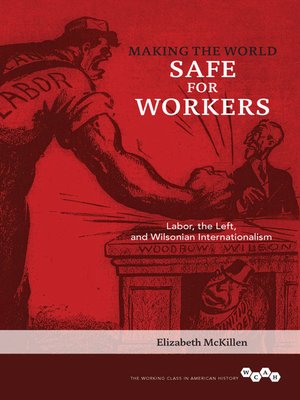Making the World Safe for Workers
ebook ∣ Labor, the Left, and Wilsonian Internationalism · Working Class in American History
By Elizabeth McKillen

Sign up to save your library
With an OverDrive account, you can save your favorite libraries for at-a-glance information about availability. Find out more about OverDrive accounts.
Find this title in Libby, the library reading app by OverDrive.



Search for a digital library with this title
Title found at these libraries:
| Library Name | Distance |
|---|---|
| Loading... |
In this intellectually ambitious study, Elizabeth McKillen explores the significance of Wilsonian internationalism for workers and the influence of American labor in both shaping and undermining the foreign policies and war mobilization efforts of Woodrow Wilson's administration. McKillen highlights the major fault lines and conflicts that emerged within labor circles as Wilson pursued his agenda in the context of Mexican and European revolutions, World War I, and the Versailles Peace Conference. As McKillen shows, the choice to collaborate with or resist U.S. foreign policy remained an important one for labor throughout the twentieth century. In fact, it continues to resonate today in debates over the global economy, wars in Iraq and Afghanistan, and the impact of U.S. policies on workers at home and abroad.
| Cover Title Page Copyright Page Contents Preface and Acknowledgments Introduction Part I: Mexico and the Western Hemisphere Chapter 1: The Mexican Revolution as Catalyst Part II: World War I and the U.S. Labor Debate over Neutrality and Preparedness Chapter 2: The Outbreak of World War I and the Socialist "War on War" Chapter 3: Antiwar Cultures of the AFL, the Debate over Preparedness, and the Gompers Turnabout Part III: U.S. Belligerency Chapter 4: Dialectical Relationships Chapter 5: The AFL, International Labor Politics, and Labor Dissent in 1918 Part IV: Versailles and Its Aftermath Chapter 6: Making the World Safe for Workers? Chapter 7: U.S. Labor Irreconcilables and Reservationists and the Founding ILO Conference in Washing Conclusion Notes Abbreviations and Primary Sources Index | "A well-written narrative that draws on diverse schools of scholarship, including labour, gender, Black, borderland, immigration, and international relations. Making the World Safe for Workers is an enlightening study of an undeservedly forgotten chapter in modern history."—Labour/Le Travail
"In fact, this work presents an insightful case study of a conflict that continues to divide the workers' movement: what should the relationship of labor be with U.S. foreign policy?"—Labor Studies Journal
"A masterpiece of historical scholarship that blends finely grained institutional analysis of the labor movement, a bottom-up account of foreign policy, and a fascinating story of policy making. Highly recommended."—Choice
"McKillen shows the strength of the antiwar impulses within American labor. An important breakthrough."—The Journal of American History
"On the whole, McKillen's Making the World Safe for Workers makes a major contribution in our understanding of domestic opposition to and support for World War 1 and Wilsonian diplomacy."—Canadian Journal of History
"McKillen is an enthusiastic advocate of transnational history, and this book advances her cause. It is richly documented and keenly analytic. Space forbids a full discussion of many of the issues she raises. Everyone interested in transnational labor history should read it." —Journal of the Gilded Age and Progressive Era
|Elizabeth McKillen is a professor of history at the University of Maine and the author of Chicago Labor and the Quest for a Democratic Diplomacy: 1914–1924.
| Cover Title Page Copyright Page Contents Preface and Acknowledgments Introduction Part I: Mexico and the Western Hemisphere Chapter 1: The Mexican Revolution as Catalyst Part II: World War I and the U.S. Labor Debate over Neutrality and Preparedness Chapter 2: The Outbreak of World War I and the Socialist "War on War" Chapter 3: Antiwar Cultures of the AFL, the Debate over Preparedness, and the Gompers Turnabout Part III: U.S. Belligerency Chapter 4: Dialectical Relationships Chapter 5: The AFL, International Labor Politics, and Labor Dissent in 1918 Part IV: Versailles and Its Aftermath Chapter 6: Making the World Safe for Workers? Chapter 7: U.S. Labor Irreconcilables and Reservationists and the Founding ILO Conference in Washing Conclusion Notes Abbreviations and Primary Sources Index | "A well-written narrative that draws on diverse schools of scholarship, including labour, gender, Black, borderland, immigration, and international relations. Making the World Safe for Workers is an enlightening study of an undeservedly forgotten chapter in modern history."—Labour/Le Travail
"In fact, this work presents an insightful case study of a conflict that continues to divide the workers' movement: what should the relationship of labor be with U.S. foreign policy?"—Labor Studies Journal
"A masterpiece of historical scholarship that blends finely grained institutional analysis of the labor movement, a bottom-up account of foreign policy, and a fascinating story of policy making. Highly recommended."—Choice
"McKillen shows the strength of the antiwar impulses within American labor. An important breakthrough."—The Journal of American History
"On the whole, McKillen's Making the World Safe for Workers makes a major contribution in our understanding of domestic opposition to and support for World War 1 and Wilsonian diplomacy."—Canadian Journal of History
"McKillen is an enthusiastic advocate of transnational history, and this book advances her cause. It is richly documented and keenly analytic. Space forbids a full discussion of many of the issues she raises. Everyone interested in transnational labor history should read it." —Journal of the Gilded Age and Progressive Era
|Elizabeth McKillen is a professor of history at the University of Maine and the author of Chicago Labor and the Quest for a Democratic Diplomacy: 1914–1924.







